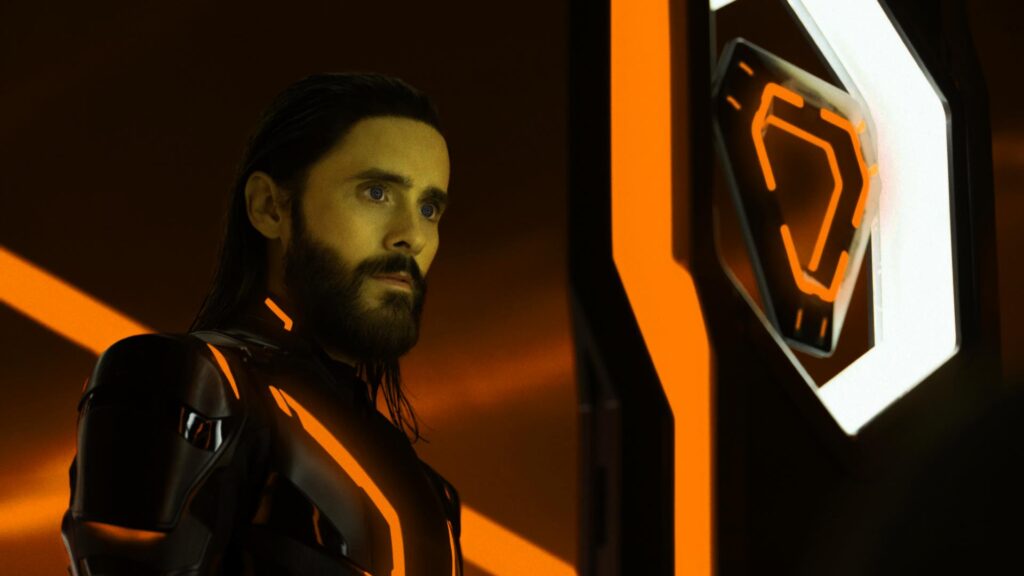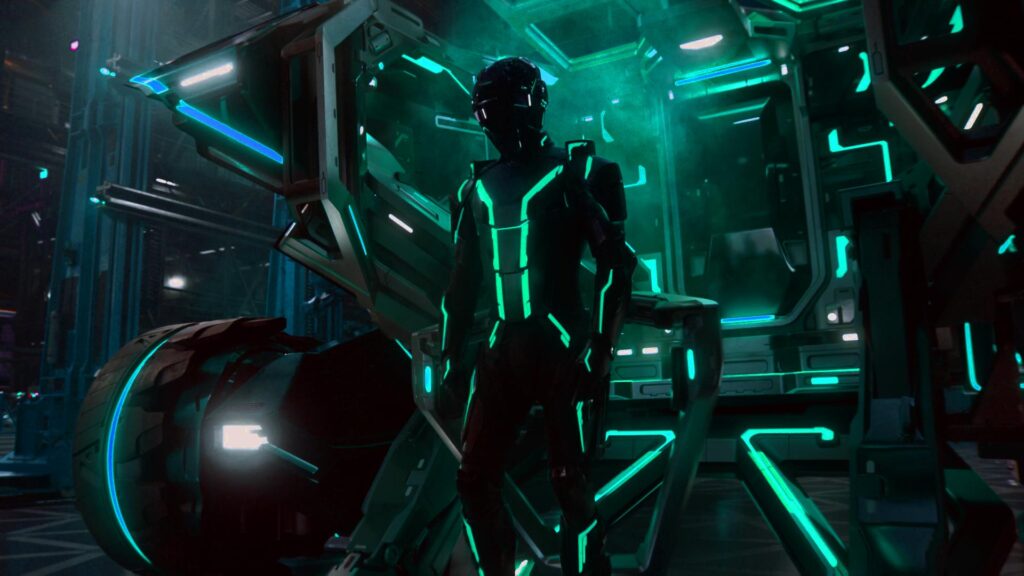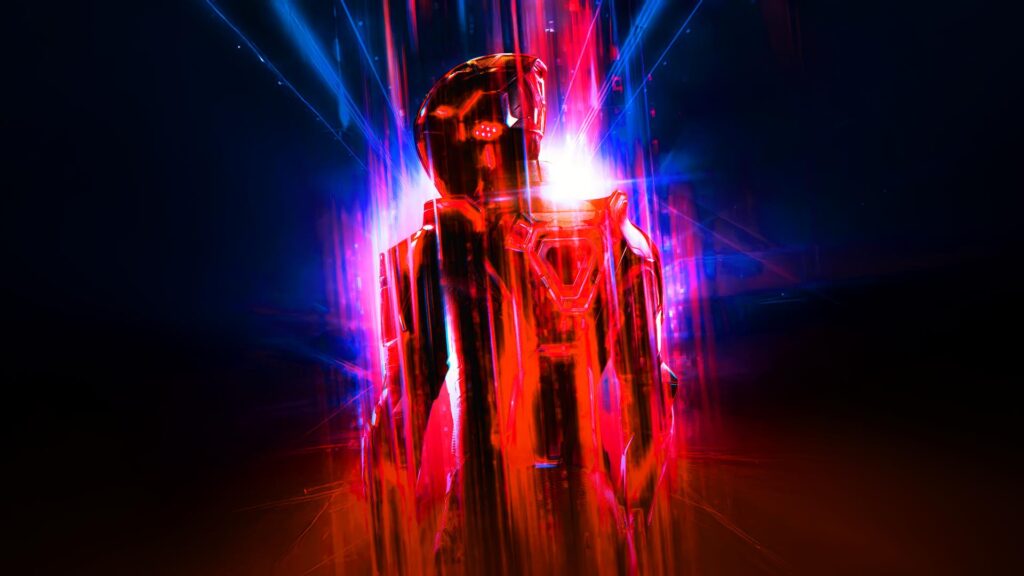The highly anticipated sci-fi epic Tron: Ares is gearing up to take audiences on a visually electrifying journey that pushes the boundaries of technology and storytelling. Building on the legacy of the Tron franchise, this new installment promises a fresh chapter filled with thrilling action, cutting-edge visuals, and a bold narrative twist that brings the digital frontier crashing into the real world.
Directed by Joachim Rønning, best known for his work on Pirates of the Caribbean: Dead Men Tell No Tales, the film stars Jared Leto in a central role as Ares—an advanced AI program created within the Grid. The story follows Ares as he is unexpectedly transferred from the sleek, neon-lit virtual realm into the unpredictable and chaotic human world. Tasked with a dangerous mission that could change the course of both dimensions, Ares must confront the unknown while grappling with the complexities of human emotion, identity, and free will.
From what the first trailer has shown, Tron: Ares is shaping up to be a heart-racing spectacle that merges philosophical themes with blockbuster-scale action. With its sleek design, pulsating soundtrack, and high-concept sci-fi elements, the film is poised to reintroduce the Tron universe to a new generation while delivering the kind of immersive cinematic experience fans have been waiting for.

For years, fans of the Tron franchise have been hoping for a continuation of the digital saga that began with the original 1982 film and expanded with Tron: Legacy in 2010. When news of Tron: Ares finally broke, excitement was met with some hesitation—especially when it was revealed that much of the story would unfold not inside the digital Grid, but in the real world. This narrative shift raised eyebrows, leaving many wondering if stepping away from the franchise’s signature neon-lit cyber-realm would dilute what made Tron unique in the first place.
However, the first trailer for Tron: Ares has turned that skepticism into genuine anticipation. Rather than abandoning the heart of Tron, the footage demonstrates how the film is expanding the universe in bold and exciting ways. The transition from the digital world to the physical one is filled with high-energy sequences, breathtaking visual effects, and a sense of urgency that adds new depth to the conflict. With Jared Leto leading the charge as Ares—an advanced program thrust into our world—the story explores unfamiliar territory while maintaining the sleek, tech-heavy aesthetic fans love.
With its fresh direction, intense action, and cinematic ambition, Tron: Ares may prove to be a game-changer for the franchise. What once seemed like a risky shift in setting now appears to be a clever evolution of the narrative. If the final film delivers on the promise of the trailer, Tron: Ares could very well become the most compelling and emotionally resonant chapter in the series yet—bridging digital and physical realities in a way the franchise has never done before.
Tron: Ares’ Shift to an Earth-Focused Story Had Me Doubting at First.

The Tron series has consistently been known for its striking visuals, often set within a digital universe that draws viewers into a vibrant world of illuminated circuits and high-tech landscapes. By juxtaposing live-action characters with a neon-lit, virtual environment, the Tron films offered a unique escape into a futuristic universe that captivated audiences with its dazzling style. These visually arresting scenes became a key element of the franchise’s identity, making it a thrilling experience for those seeking adventure and innovation on the big screen.
While the original Tron film, released in 1982, was groundbreaking for its time, some of its visual effects have since been surpassed by modern technology. Despite this, the film’s bold attempt at creating a digital world left an indelible mark on cinema. It wasn’t until the release of Tron: Legacy in 2010, however, that the franchise truly showcased its potential. Using cutting-edge visual effects and a refined aesthetic, Tron: Legacy transformed the concept of a digital world into something deeply immersive and visually convincing. The seamless blending of live-action and CGI made it clear that Tron had evolved into a cutting-edge visual spectacle that could rival any contemporary blockbuster.
This leap in technological advancement laid the groundwork for immense anticipation surrounding the third film in the series, Tron: Ares. After the success of Tron: Legacy, fans and critics alike were eager to see how the franchise would continue to push the boundaries of visual effects. The third installment promised to deliver even more mind-blowing imagery and, given the advancements in filmmaking, it’s clear that Tron: Ares has the potential to exceed expectations and deliver a futuristic, visually arresting experience that could take the Tron legacy to even greater heights.
When it was first announced that a significant part of Tron: Ares would unfold in the real world rather than the digital realm, many longtime fans were understandably concerned. The idea of moving the action away from the franchise’s signature virtual environment felt like a major shift—one that risked losing what made Tron so iconic in the first place. After all, much of the series’ appeal has always stemmed from its futuristic setting, where glowing grids, light cycles, and a sleek, stylized aesthetic create an atmosphere unlike anything else in science fiction cinema.
Over the years, the digital world of Tron has become synonymous with fast-paced action, visually stunning sequences, and a kind of immersive escapism that’s hard to replicate in a real-world setting. The concept of placing a story mostly outside of that familiar terrain initially felt like a step backward—especially for fans who were hoping for an even deeper dive into the Grid’s complex digital ecosystem. With so much of the franchise’s identity tied to its neon-drenched landscapes and high-tech fantasy, taking the action to Earth raised doubts about whether the third installment could live up to its predecessors.
From that perspective, it wasn’t difficult to see why early reactions to the setting shift leaned toward skepticism. For fans who had waited over a decade for another installment, the idea of trading the visually rich digital universe for a more grounded, real-world backdrop didn’t seem like the kind of cinematic experience that justified the long wait—or the ticket price. It felt, at first glance, like a move that could dilute the unique style and energy that Tron had always delivered.
The Tron: Ares Trailer Shows How a Real-World Setting Can Elevate the Story.

At CinemaCon 2025, attendees were treated to the first look at Tron: Ares, offering an exciting glimpse into the direction the franchise is heading. The preview showcased Ares, accompanied by a team of sophisticated AI entities, as they transitioned from the virtual Grid into the physical world. This bold narrative shift marks a significant evolution in the Tron universe, as it explores what happens when the virtual realm no longer remains confined to cyberspace. Rather than returning to the well-known digital setting of the Grid, Tron: Ares explores new ground by introducing an exciting collision between advanced technology and the real world.
Over ten years since Tron: Legacy hit theaters, the latest chapter revitalizes the series by flipping its traditional concept on its head. Rather than humans being pulled into a digital world, the digital creations now emerge into the physical one, bringing their high-tech vehicles and environments with them. Scenes shown at CinemaCon revealed sleek lightcycles racing through real-world streets and massive airborne carriers hovering over tangible landscapes—all blending together through seamless effects. This fusion of the virtual and physical promises not only a visual spectacle, but also a deeper exploration of AI, identity, and the consequences of digital life crossing into the human world.
The visual direction taken in Tron: Ares offers a refreshing twist that sets it apart from its predecessors and gives the sequel a strong narrative reason to exist. While previous films in the franchise stayed largely within the digital confines of the Grid, this new installment dares to expand the universe in a bold and unexpected way. Had the story remained inside the Grid, it might have risked feeling too familiar, simply repeating the same formula with updated visuals. Instead, by taking the action into the real world, Tron: Ares opens up new creative opportunities and raises the stakes in a way that feels both timely and thrilling.
The trailer highlights this shift by showcasing powerful digital technology—such as light-based weaponry and sleek vehicles—making their way into physical reality. Watching these elements cross over into our world reveals a startling imbalance: humanity appears completely unprepared for what these advanced AI programs are capable of. This contrast between human vulnerability and machine dominance adds a sense of urgency and tension that hasn’t been explored in the franchise before. It’s this clash between worlds, both visually and thematically, that makes Tron: Ares such an intriguing and potentially game-changing entry in the series.
Tron: Ares Official Trailer.
Read more ,
https://en.wikipedia.org/wiki/Tron:_Ares

